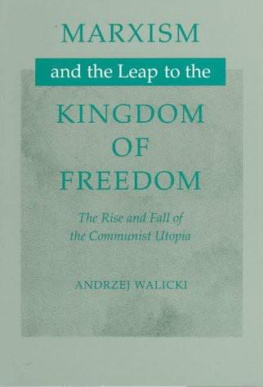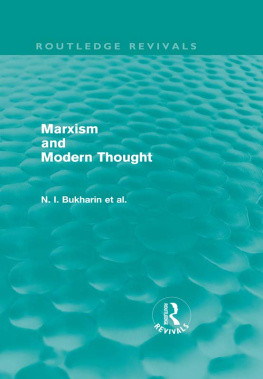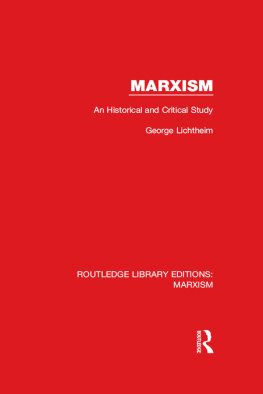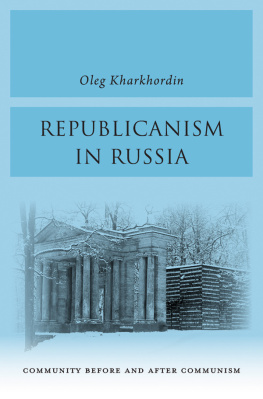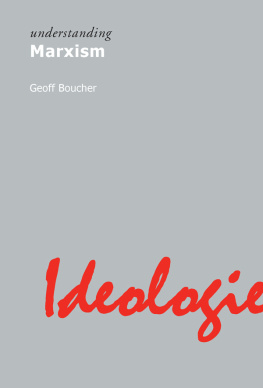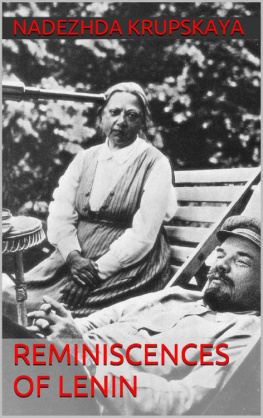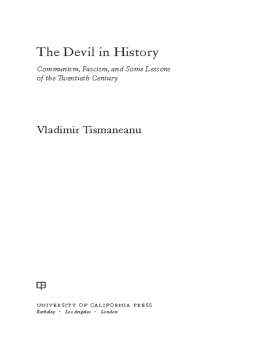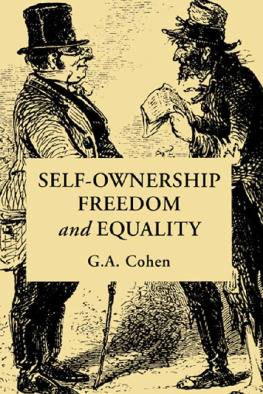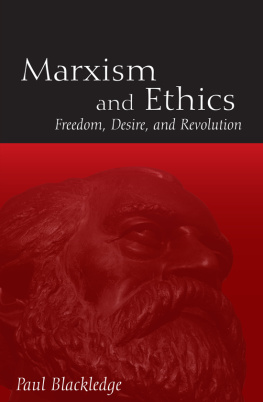Acknowledgments
This book, which was finished in September 1992, is mostly a result of several years of my research and teaching at the University of Notre Dame. Several chapters are directly related to my graduate courses on "The Marxist Conception of Freedom," "Soviet Marxism," and "The Marxist Theory of Communism."
Work on this book was also supported by the following institutions: the Social Philosophy and Policy Center at the University of Bowling Green (Ohio), where I spent the spring semester of 1989; the J. S. Guggenheim Memorial Foundation, whose fellowship in 1990-91 enabled me to enjoy several months of productive work and lively scholarly contacts in Russia; and finally, the Humanities Research Centre of the Australian National University (Canberra), which offered me three months' visiting fellowship from May through August 1992. To all these institutions, grateful acknowledgment is made.
Among friends and colleagues to whom I feel indebted for helping me to persist in coping with the vast and often thankless subject of this book, I should mention the following:
Dr. Zbigniew Pelczynski, from Pembroke College, Oxford, who in 1980 became interested in my views on Marxism and asked me to write an essay on "The Marxian Conception of Freedom" for the book Conceptions of Liberty in Political Philosophy (ed. Z. Pelczynski and J. Gray, London, 1984); Professor Leszek Kolakowski, an old friend who read this essay in 1981 and, despite his declining interest in the subject, encouraged me
-vii-
to continue my work in this field; Sir Isaiah Berlin, who read my article "Marx and Freedom," commented on it in a long letter to me, and recommended it for publication in the New York Review of Books; and finally, Professor T. H. Rigby, from the Australian National University, who read the last two chapters, commented on them, and above all, supported my hope that a book by an intellectual historian might prove interesting and relevant to political scientists.
I am grateful also to Mrs. Elisabeth Short, the research assistant in the History of Ideas Unit in the Australian National University, for reading chapters 4, 5, and 6 and greatly improving my style. Of course, she is not responsible for the final linguistic shape of this work.
-viii-
Contents
|
|
1. Marx as Philosopher of Freedom | | 1.2. Civil and Political Liberty: A Confrontation with Liberalism |
| | 1.3. The Story of Self-Enriching Alienation: A General Outline |
| | 1.4. The Paris Manuscripts: Human Essence Lost and Regained |
| | 1.5. The German Ideology: The Division of Labor and the Myth of Human Identity |
| | 1.6. Grundrisse: The World Market as Alienated Universalism |
| | 1.7. Self-Enriching Alienation in Capital and the Abandonment of Youthful Optimism |
| | 1.8. The Vision of the Future: The Transition Period and the Final Ideal |
| | 1.9. Capitalism and Freedom in the Post-Marxian Sociological Tradition: The Case of Marx Versus Simmel |
|
|
2. Engels and "Scientific Socialism"| 2.1. The Problem of "Engelsian Marxism" |
| | 2.2. From Pantheism to Communism |
| | 2.3. Political Economy and Communist Utopia |
| | 2.4. "Historical Necessity" in the World of Nations |
|
|
-ix-
| 2.5. Freedom as "Necessity Understood" |
| | 2.6. From Freedom Lost to Freedom... Regained? |
| |
|
3. Variants of "Necessitarian" Marxism| 3.1. Karl Kautsky: From the "Historical Necessity" of Communism to the "Historical Necessity" of Democracy |
| | 3.2. Georgii Plekhanov: "Historical Necessity" as Utopian Ideal |
| | 3.3. Rosa Luxemburg, or Revolutionary Amor Fati |
|
|
4. Leninism: From "Scientific Socialism" to Totalitarian Communism| 4.1. Lenin's Tragedy of Will and Fate |
| | 4.2. Lenin's Critique of "Bourgeois Freedom" and the Russian Populist Heritage |
| | 4.3. The Workers' Movement and the Party |
| | 4.4. The Destruction of "Nomocracy" and the Legitimization of Violence |
| | 4.5. The Partisan Principle in Literature and Philosophy |
| | 4.6. The Dictatorship of the Proletariat and the State |
| | 4.7. The Dictatorship of the Proletariat and the Law |
| | 4.8. The Dictatorship of the Proletariat and the Economic Utopia |
|
|
5. From Totalitarian Communism to Communist Totalitarianism| 5.1. Leninism and Stalinism: The Controversy over the Continuity Thesis |
| | 5.2. Stalinist Marxism as a Total View of the World |
| | 5.3. "Dual Consciousness" and Totalitarian "Ideocracy" |
|
|
| 6. The Dismantling of Stalinism: Detotalitarization and Decommunization |

